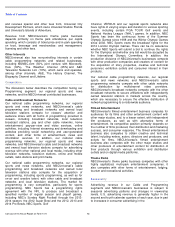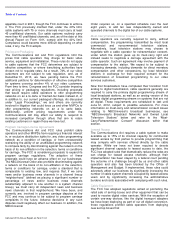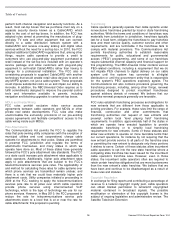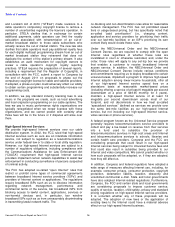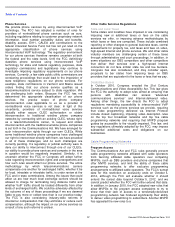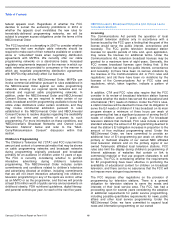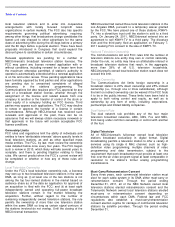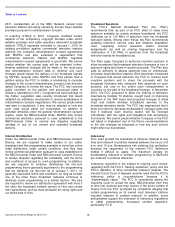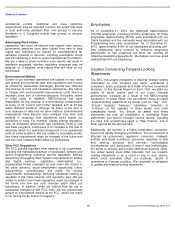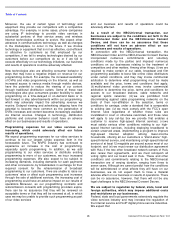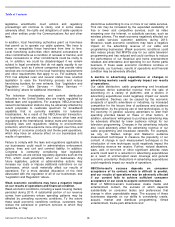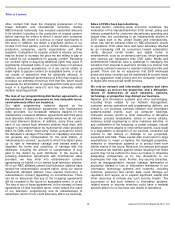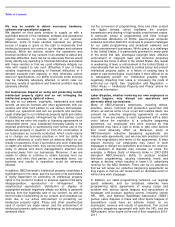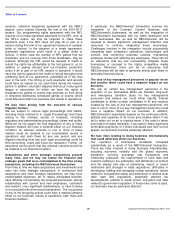Comcast 2010 Annual Report Download - page 26
Download and view the complete annual report
Please find page 26 of the 2010 Comcast annual report below. You can navigate through the pages in the report by either clicking on the pages listed below, or by using the keyword search tool below to find specific information within the annual report.
Table of Contents
21
Comcast 2010 Annual Report on Form 10-
K
vague and difficult to apply, could have an adverse effect on
our cable programming and broadcast businesses.
Sponsorship Identification and Advertising
Federal legislation and FCC rules provide that whenever a
broadcast station transmits any programming for which it has
received money, service or other valuable consideration, it
must provide an accurate on-air identification of the sponsor
of the programming. In a proceeding dating to June 2008, the
FCC is examining whether “embedded advertising,” such as
product placements and product integration, in broadcast
programming should be subject to stricter disclosure
requirements and whether the sponsorship identification rules
should be extended to cable programming networks. The
adoption of some of these proposals could adversely affect
our businesses.
The FTC Guides Concerning the Use of Endorsements and
Testimonials require that any material connection between
the advertiser and the endorser that is not reasonably
expected by the audience must be disclosed and that all
claims made through endorsements be truthful and
substantiated when made. These requirements apply to
traditional advertising, as well as sponsored on-air patter, talk
show discussions and blogs. Advertising practices
inconsistent with these guides may result in enforcement
action by the FTC, typically against the advertiser and/or the
endorser, although there is a possibility that a broadcaster
may also face legal liability in certain cases.
International Regulation
International regulation of television broadcasting varies
widely according to jurisdiction and includes regulation of
such areas as programming and advertising. In the European
Union (“EU”), the Audio Visual Media Services Directive
establishes minimum levels of regulation across all EU
member states focused on content and advertising. This
directive extends regulation to nonlinear television services,
establishes a “country of origin principle,” which determines
the relevant regulatory jurisdiction for each service, and sets
quotas where practicable for European programming and
programming by independent producers. EU countries are
free to impose stricter regulation in certain areas and have
taken different approaches to imposing such quotas. The
majority of our European channels are under United Kingdom
jurisdiction as the country of origin and therefore subject to
regulation by its regulator. Changes to implementation of the
country of origin principle or quotas could adversely affect our
international television broadcast business.
Filmed Entertainment
United States
NBCUniversal’s filmed entertainment business is subject to
the provisions of so-called “trade practice laws” in effect in 25
states and Puerto Rico relating to theatrical distribution of
motion pictures. These laws substantially restrict the
licensing of motion pictures unless theater owners are first
invited to attend a screening of the motion pictures and, in
certain instances, also prohibit payment of advances and
guarantees to motion picture distributors by exhibitors.
Further, under various consent judgments, federal and state
antitrust laws and state unfair competition laws,
NBCUniversal’s motion picture company and certain other
motion picture companies are subject to certain restrictions
on trade practices in the United States, including a
requirement to offer motion pictures for exhibition to theaters
on a theater-by-theater basis. In December 2009, the FTC
issued a report calling for stronger industry safeguards
applicable to the marketing of violent movies to children, and
concluding that movie studios intentionally market PG-13
movies to children under 13 and that unrated DVDs
undermine the Motion Picture Academy of America’s rating
system and confuse parents. The FTC has not called for
regulation or enforcement against movie studios, but any
such government action in this area could have a negative
impact on NBCUniversal’s filmed entertainment business.
International
In countries outside the United States, there are a variety of
existing or contemplated governmental laws and regulations
that may affect NBCUniversal’s ability to distribute and/or
license motion picture and television products, as well as
consumer merchandise products, including copyright laws
and regulations that may or may not be adequate to protect
its interests, film screen quotas, television quotas, regulation
of content, regulated contract terms, product safety and
labeling requirements, discriminatory taxes and other
discriminatory treatment of U.S. products. The ability of
countries to deny market access or refuse national treatment
to products originating outside their territories is regulated
under various international agreements, including the World
Trade Organization’s General Agreement on Tariffs and
Trade and General Agreement on Trade and Services;
however, these agreements have limited application with
respect to preventing the denial of market access to audio-
visual products originating outside the European Union.
Theme Parks
NBCUniversal’s theme parks business is subject to regulation
at the international, federal, state and local levels, including
laws and regulations regarding environmental protection,
privacy and data protection, consumer product safety and
theme park operations, such as health, sanitation, safety and
fire standards and liquor licenses.


